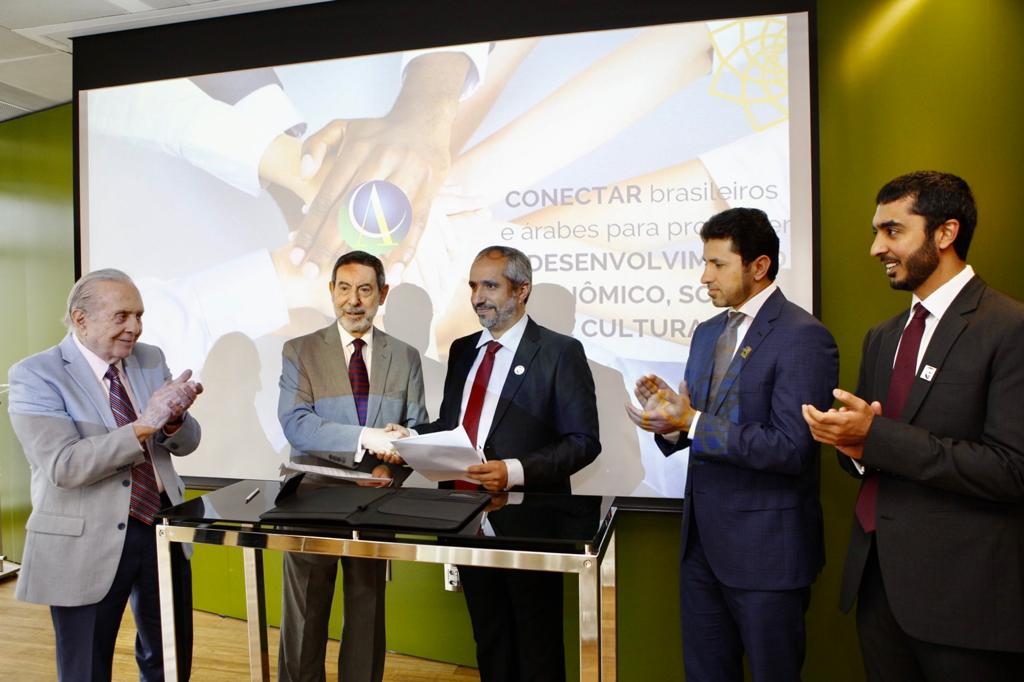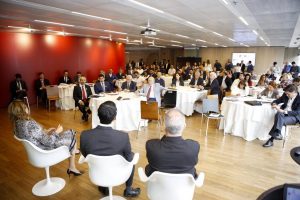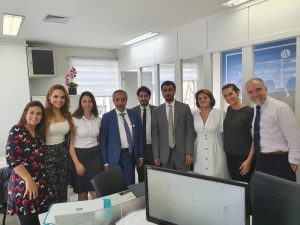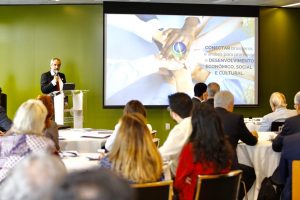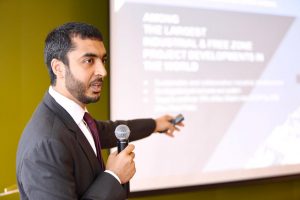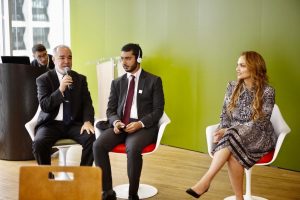São Paulo – Khalifa Port in Abu Dhabi is one of the Gulf’s most important ports and has now a handling capacity of 2.5 million twenty-foot equivalent unit (TEU). The goal is reaching and maybe surpassing 9.1 million TEU by 2021 according to the CEO of Abu Dhabi Ports, the company that runs the port in the capital of the United Arab Emirates, Saif Al Mazrouei. “The expansion project is underway. We’ve built islands in the sea and are concerned about the environment,” said Mazrouei, adding that two years ago, the port’s capacity was 1.5 million TEU.
The executive talked during a seminar on business opportunities in the Port Free Trade Zone of Abu Dhabi this Wednesday (27) at the Arab Brazilian Chamber of Commerce in São Paulo. The presentation brought together seventy representatives from companies of foodstuffs, coffee, cosmetics, mining, construction, trading, foreign trade consultancy, and others.
The event featured talks by Khalifa Industrial Zone of Abu Dhabi (KIZAD) commercial director Khalid Al Marzooqi, consul of the UAE in São Paulo Ibrahim Salem Alalawi, Dubai Exports exports department specialist Zilda Rosa, KIZAD engineer and agent Eduardo Kezh, Arab Chamber foreign affairs vice president ambassador Osmar Chohfi and market intelligence manager Ana Becker. Pictured above, from the left, Arab Chamber chairman Walid Yazigi, Chohfi, Mazrouei, Alalawi and Marzooqi signing a memorandum of understanding between the Arab Chamber and the Abu Dhabi Ports.
“Abu Dhabi has one of the region’s largest ports and a business potential of billions of dollars. I’m proud to see Brazilian companies with KIZAD. If you already have an operation in the UAE or want to start one, we’re here to help,” said Mazrouei. “We came after the visit of Brazil’s president to the UAE last October. We’d like to explore more opportunities for inbound and outbound investments. We’re seeking out different investment opportunities here. We’ve visited Rio, Itajaí and São Paulo, and we’d like to offer Brazilian companies business opportunities in and around Abu Dhabi and show how they could globally expand their businesses using our services at KIZAD,” added Marzooqi.
The director reported that KIZAD has two facilities, the free zone and local zone, and you need to study the consumer market to choose which one is the best option. “If it’s a local or regional consumer, depending on the business model, there are customs variations that should be studied on a case-by-case basis,” said Marzooqi.
According to him, most countries around the UAE are emerging countries with a Gross Domestic Product (GDP) growth over 5% per year and young populations. Khalifa Port and its free zone are strategically located between Dubai and Abu Dhabi, and its priority industries are polymers, metals, foodstuffs, cars, oil and gas, logistics and power. Marzooki said that what makes KIZAD stand out for Brazilian companies that want to operate abroad are low cost, swiftness, growth scale, the surrounding community, and business consistency and reliability.
“We are a one-stop shop, so you can start small with just an office, then expand slowly. JBS started this way and now has a large operation in our region,” said the director referring to the Brazilian food giant, although it does not operate from the free zone. BRF, another Brazilian food industry, started its operations in Jebel Ali Free Zone in Dubai (Jafza), and now is in KIZAD.
(Story continues after the photo gallery)
Ana Becker gave a presentation on the UAE trade relations and economic potential. “The UAE has the Arab League’s second largest GDP per capita and a huge business opportunity potential,” she said. The country’s economy is divided in industry and services. Industry is mostly comprised of oil and petrochemicals, fertilizers, aluminum and cement, while services comprise tourism, port logistics, the free zones, real state, and retail.
“The UAE are a great exporting hub; they buy and resell many products to other countries and now are Brazil’s third largest buyer among the Arab countries,” the executive said. The top two are Egypt and Saudi Arabia.
Before arriving in São Paulo, the Abu Dhabi delegation visited Rio de Janeiro (RJ) and Itajaí (SC). “During our visits to Itajaí and Rio de Janeiro, we got to know some potential companies and are in early negotiations with them. We’ve enjoyed Brazil and we’re here because our countries have a strong economic and trade relation and we see many opportunities that we could explore, especially in Abu Dhabi and for Brazilian companies in Abu Dhabi. We’re focused in the navigation and logistics industries as well as sectors that could add value to business. I’m grateful to the Arab Chamber for making it easier for potential partners to visit the UAE,” said Mazrouei.
According to consul Alalawi, “the UAE are steadily working on delivering economic reforms and offering investment incentives to step up competitiveness and help businesspeople and investors from all over the world achieve more success and progress in their homeland.”
“The UAE logistic industry has gained presence thanks to all the investment the country has applied in its port infrastructure, free zones as well as a transport industry that is increasingly relevant for the local economy. KIZAD is one of these free zones and a real model within the country,” said Osmar Chohfi while opening the event.
Zilda Rosa and Eduardo Kezh talked about their experiences as Brazilians living in the UAE and answered some questions about their work and the labor force for companies in the Arab country. “It’s a great place to live in. It’s safe and has a cheap labor as the Asian Southeast countries, such as India and Bangladesh, but you can repatriate people from other countries, including Brazil, if you need a more skilled labor – then the company is responsible for obtaining the worker visa, healthcare and housing for the employee. Everyone is welcome in the UAE,” said Rosa. The consul finished by pointing out that it’s not required anymore to obtain a visa to the UAE and that over 8,000 Brazilians now live there.
After the event, a memorandum of understanding (MOU) was signed between the Arab Chamber and Abu Dhabi Ports for technical cooperation, promotion of the port, eventual joint events, and other activities.
The event featured Arab Chamber chairman Walid Yazigi and Administrative vice president Mohamad Mourad, and KIZAD director William Atui and business manager Mansoor Al Marar.
Translated by Guilherme Miranda



